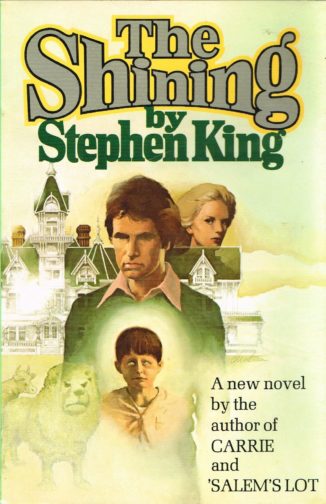By STEPHEN KING (Doubleday; 1977)
Regarding Stephen King’s “masterpiece” THE SHINING, I part ways with most of the horror community. Sure it’s an immensely readable book with a vivid depiction of claustrophobia and a few memorable scares (emphasis on few), but THE SHINING’s flaws, I believe, outweigh its strengths.
You probably know the story: the recovering alcoholic writer Jack moves with his wife Wendy and young son Danny to the deserted Overlook hotel in Colorado. Jack has agreed to act as the wintertime caretaker, unaware that the place is haunted. Danny knows this because he’s telekinetic, a “gift” that manifests itself in the form of a spectral boy named Tony who visits Danny on occasion and warns him of terrible things on the horizon. When the Overlook is hit by a massive storm Jack, Wendy and Danny are snowed in, and fall prey to the supernatural menace suffusing the place.
As rendered here Danny is the most impossibly noble, well behaved and self-sacrificing six year old ever, harboring no resentment toward his father for breaking his arm years earlier in a drunken rage, and worried only that his parents might divorce—which doesn’t seem like a bad idea, given that Jack is a total loser whose alcoholic outrages take up a large portion of the book’s opening third. Jack’s gradual descent into madness, spurred by the Overlook’s ghosts, isn’t terribly affecting considering he appears to be at least partway there at the book’s beginning.
There’s also the fact that not a whole lot really happens. King concentrates the majority of his narrative on a few overwrought set pieces, of which only one—the revelation of what resides in room 213—is especially effective. As for the others, at least two of them involve moving hedge animals, which despite King’s best efforts never seemed particularly scary to me. A further negative is the derivativeness of much of the narrative; THE HAUNTING OF HILL HOUSE is referenced throughout, while Danny’s interactions with the spectral Tony are remarkably similar to those of the youthful protagonists of Thomas Tryon’s THE OTHER (1971).
Another complaint is the title (King allegedly added the “ing” after learning his intended moniker THE SHINE was a racial slur), which inspired a score of “ing” titled horror novels (THE SEARING, THE PIERCING, THE HARROWING, THE SHARING, THE HOWLING, etc). The novel was also responsible for a lousy 1997 TV miniseries, as well as the famous 1980 film by Stanley Kubrick.
Stephen King detests Kubrick’s film, but I think King’s comments in DANSE MACABRE (1981) on how Brian De Palma’s film adaptation of CARRIE was “more deft…and a good deal more artistic” than the book, which apparently “lacks the style” of the film, tend to apply equally well to THE SHINING and its movie incarnation.

